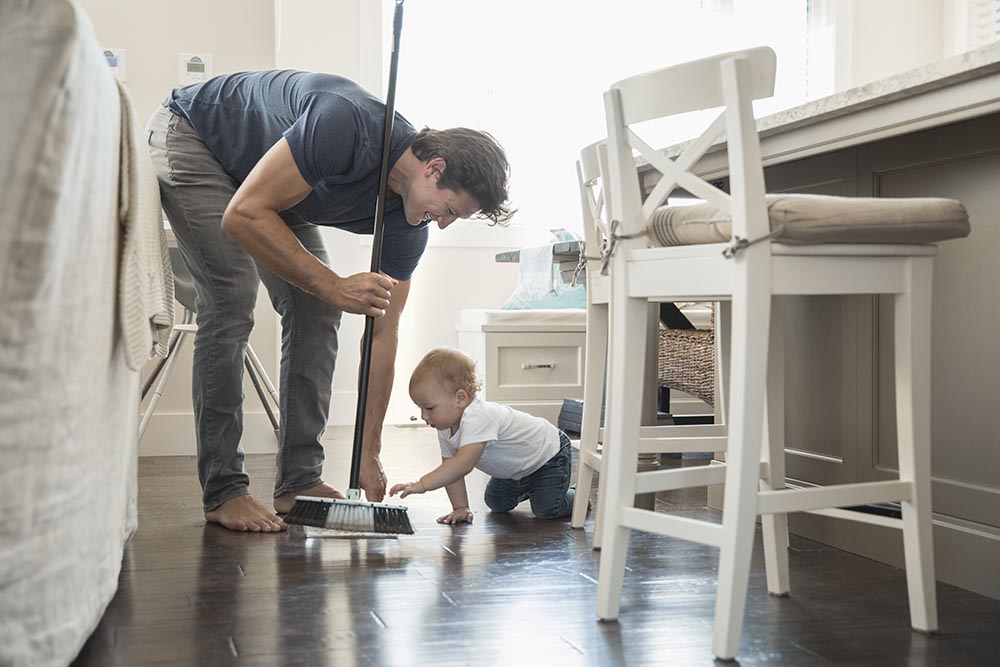How to allergy-proof your home

Bed and bedding
Encase pillows, mattresses and box springs in dust mite-proof covers. Wash sheets, pillowcases and blankets regularly in water heated to at least 54 degrees. Remove and wash comforters. Replace wool or feathered bedding with synthetic materials.
Flooring
Hardwood or linoleum flooring and washable rugs are preferable to carpet. If they aren’t an option, use low-pile instead of high-pile carpet and vacuum weekly with a cleaner that has a small-particle or high-efficiency particulate air (HEPA) filter. Shampoo the carpet frequently.Curtains and blinds
Use washable curtains made of plain cotton or synthetic fabric. Replace horizontal blinds with washable roller-type shades.Windows
Close windows and, if possible, use airconditioning during pollen season. Clean mould and condensation from window frames and sills.Furnishings
Choose easy-to-clean chairs, dressers and bedside tables made of leather, wood, metal or plastic. Avoid upholstered furniture.Clutter
Remove items that collect dust, such as ornaments, books and magazines. Store children’s toys, games and stuffed animals in plastic bins.Pets
Keep animals out of the bedrooms. Bathing pets at least once a week may reduce the amount of allergen in the hair they shed.Air filtration
Choose an air filter that has a small-particle or HEPA filter. Try adjusting your air filter so it directs clean air towards your head when you sleep.Plants
Find a new home for potted plants or spread aquarium gravel over the dirt to help contain mould.Fireplaces
Avoid using wood-burning fireplaces or stoves because smoke and gases can exacerbate respiratory allergies. Most natural gas fireplaces won’t cause this problem.Stoves
Install and use a vented exhaust fan to remove cooking fumes and reduce moisture. Most stove-top hoods simply filter cooking particulates without venting outside.Sink
Wash dishes daily. Scrub the sink and taps to remove mould and food debris.Refrigerator
Wipe up excessive moisture to avoid mould growth. Discard mouldy or out-of-date food. Regularly empty and clean the dripping pan and clean or replace mouldy rubber seals around doors.Cabinets and counters
Clean cabinets and countertops with detergent and water. Check under-sink cabinets for plumbing leaks.Food
Store in sealed containers. This includes pet food.Food waste
Place rubbish in a can with an insect-proof lid and empty it daily. Keeping the kitchen free of food crumbs will help reduce the chance that you will encounter rodents or cockroaches.Related topics
Things to note
The information in this article has been prepared for general information purposes only and is not intended as legal advice or specific advice to any particular person. Any advice contained in the document is general advice, not intended as legal advice or professional advice and does not take into account any person’s particular circumstances. Before acting on anything based on this advice you should consider its appropriateness to you, having regard to your objectives and needs.
Insurance Products (excluding Travel Insurance) are issued by RACQ Insurance Limited ABN 50 009 704 152 (RACQI) and arranged by RACQ Distribution Services Pty Ltd (RDS) ABN 35 116 361 650, AFSL 567130 and RDS' authorised representatives (including RACQ Operations Pty Ltd ABN 80 009 663 414, AR No. 234978 (RACQO)). Conditions, limits and exclusions apply.
Any advice provided by RDS and RACQO is general advice only and does not take into account your personal objectives, financial situation or needs and you will need to consider whether the advice is appropriate for you. Read the Product Disclosure Statement (PDS) before making a purchase decision on the product. You can also access our Target Market Determinations on this website.
RDS receives a commission from RACQI for the policies it arranges. RACQO receives fees paid for services it provides to RDS. Further details about remuneration are available on request prior to purchasing.
Banking and loan products issued by Members Banking Group Limited ABN 83 087 651 054 AFSL/Australian credit licence 241195 trading as RACQ Bank. Terms, conditions, fees, charges and lending policies apply. This is general advice only and may not be right for you. This information does not take your personal objectives, circumstances or needs into account. Read the disclosure documents for your selected product or service, including the Financial Services Guide and the Terms and Conditions, and consider if appropriate for you before deciding.
Except for RACQ Bank, any RACQ entity referred to on this page is not an authorised deposit-taking institution for the purposes of the Banking Act 1959 (Cth). That entity’s obligations do not represent deposits or other liabilities of RACQ Bank. RACQ Bank does not guarantee or otherwise provide assurance in respect of the obligations of that entity, unless noted otherwise.
RACQ Bank subscribes to the Customer Owned Banking Code of Practice which establishes higher standards than the law requires. The Code reflects modern consumer expectations and developments in approaches to issues such as consumer vulnerability, guarantors, and supporting customers through financial hardship. Please read our Customer Owned Banking Code of Practice page for more information.
RACQ Operations Pty Ltd (ABN 80 009 663 414 AR 000234978) and Members Travel Group Pty Ltd (ABN 45 144 538 803 AR 000432492) are acting as an Authorised Representative of the issuer of the insurance, Tokio Marine & Nichido Fire Insurance Co., Ltd. (ABN 80 000 438 291 AFSL 246 548). Any advice set out above is general in nature only, and does not take into account your objectives, financial situation or needs. Before purchasing any travel products, please consider the RACQ Travel Insurance Product Disclosure Statement (PDS) and the Target Market Determinations (TMDs) that apply to these products. Whilst the PDS outlines the Terms and Conditions of these products, the TMDs outline the intended class of customers that comprise the target market for these travel products. This will allow you to consider which products best suit your objectives, financial situation and needs and consider the products appropriateness to your personal circumstances. TMDs also outline matters involving the distribution and the review of these products. The PDS, Supplementary PDS and TMDs for each travel product can be found here.
